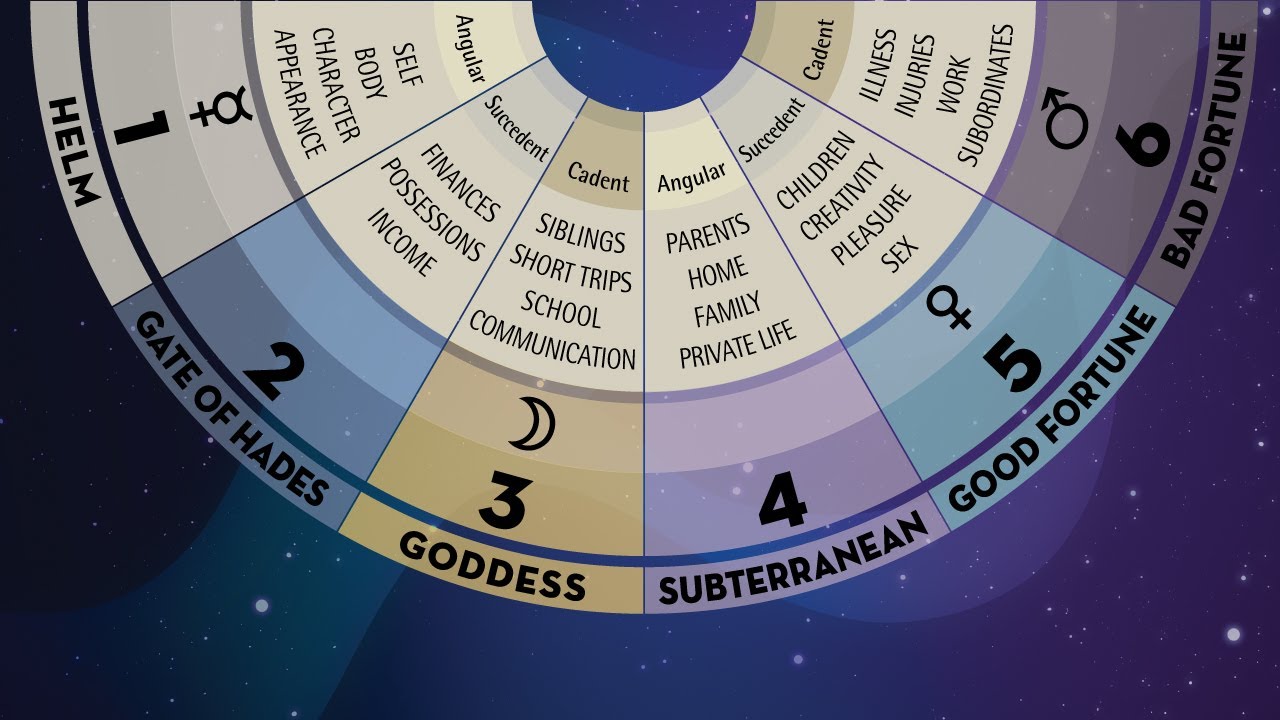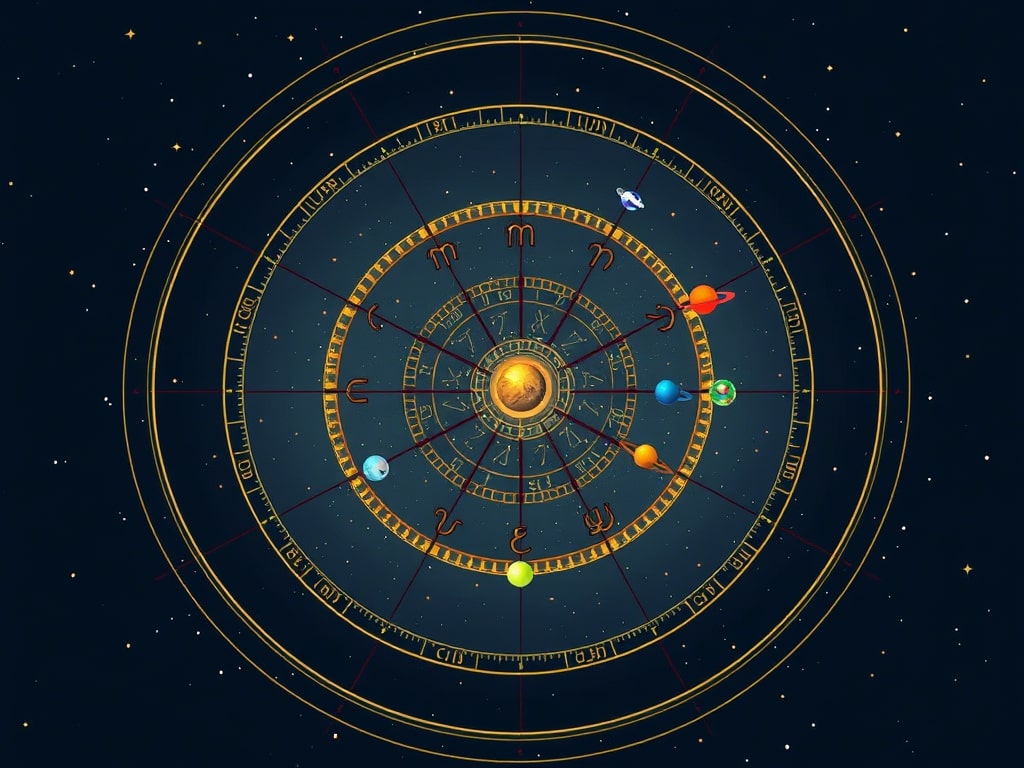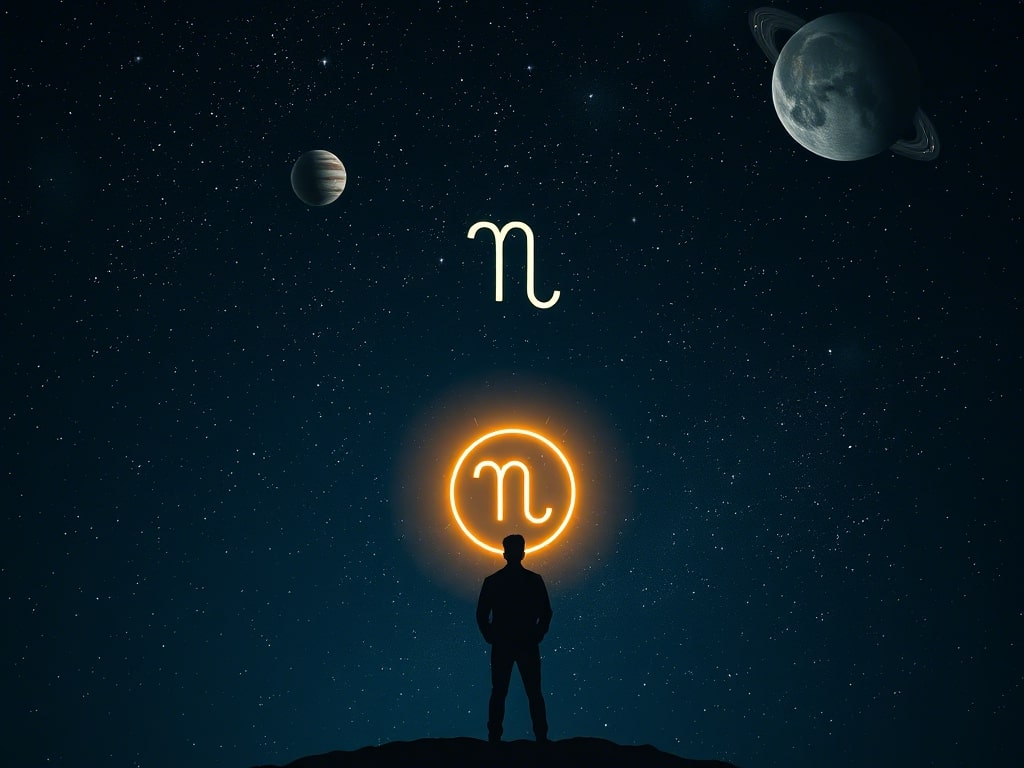12 Houses in Astrology: Complete Guide for Beginners
The 12 houses in astrology form the framework of your birth chart, each representing different areas of life and experience. Understanding these cosmic domains is essential for interpreting how planetary energies manifest in specific aspects of your life. This comprehensive guide will walk you through each house, explaining their meanings, significance, and how they influence your astrological profile.

Introduction to the Houses in Astrology
While zodiac signs describe how energy expresses itself and planets represent what type of energy is at play, houses show where these energies manifest in your life. The 12 houses divide the sky into segments, each governing specific areas of human experience.
Think of your birth chart as a stage: planets are the actors, signs are the costumes and character traits, and houses are the settings where the drama unfolds. Each house has its own themes, natural planetary ruler, and corresponding zodiac sign.
Houses are determined by the exact time and place of your birth, which is why an accurate birth time is crucial for a precise astrological reading. As Earth rotates on its axis, different zodiac signs rise on the eastern horizon, creating a unique house arrangement for each person.
House Systems in Astrology
Before diving into individual houses, it's worth noting that astrologers use different house systems to divide the chart. Some popular systems include:
- Placidus: The most commonly used system in Western astrology, based on time
- Whole Sign: Each house corresponds to one complete zodiac sign
- Equal House: All houses are 30 degrees each
- Koch: A time-based system popular in Germany
- Regiomontanus: A space-based system from medieval astrology
Each system has its merits, and many astrologers have preferences based on their experience. For beginners, Placidus or Whole Sign systems are good starting points. The house meanings remain consistent across systems, though the sign on each house cusp may change.
Angular Houses: The Four Pillars
The angular houses (1st, 4th, 7th, and 10th) are considered the most powerful and dynamic areas of the chart. They represent cardinal points and initiate action in their respective domains:
- 1st House: Self and identity (East point)
- 4th House: Home and foundations (North point)
- 7th House: Relationships and partnerships (West point)
- 10th House: Career and public image (South point)
Planets in angular houses tend to express their energy more forcefully and directly in your life. These houses correspond to the four cardinal signs (Aries, Cancer, Libra, and Capricorn) and represent areas where you actively initiate experiences.
Succedent Houses: Building and Maintaining
The succedent houses (2nd, 5th, 8th, and 11th) follow the angular houses and represent areas where we build upon, stabilize, and maintain what was initiated in the angular houses:
- 2nd House: Values and resources
- 5th House: Creativity and pleasure
- 8th House: Transformation and shared resources
- 11th House: Community and aspirations
These houses correspond to the fixed signs (Taurus, Leo, Scorpio, and Aquarius) and represent areas of life characterized by stability, determination, and resource management.
Cadent Houses: Adaptation and Transition
The cadent houses (3rd, 6th, 9th, and 12th) represent areas of life involving adaptation, transition, and mental processing:
- 3rd House: Communication and learning
- 6th House: Work and health
- 9th House: Higher learning and expansion
- 12th House: Spirituality and unconscious
These houses correspond to the mutable signs (Gemini, Virgo, Sagittarius, and Pisces) and represent areas where we adapt, process, and prepare for the next phase of development.
First House: Self and Identity
First House: The House of Self
The First House represents self, identity, and the beginning of life. It relates to how you present yourself to the world and your basic personality traits. This house is ruled naturally by Aries and Mars.
Key themes: Self-expression, identity, initiation, self-confidence, and assertiveness.
When activated: New beginnings, self-discovery, and taking initiative.
The First House is the most outward-facing area of your chart, representing your self-image and how you present yourself to the world. It shows your basic personality traits, self-confidence, and how you initiate new experiences. The sign and planets in your First House influence your self-expression and identity.
Mars in its natural house here would enhance assertiveness and confidence. The Sun might indicate leadership abilities and a desire for recognition in your chosen field. This house reveals how you express yourself and take initiative in the world.
Second House: Values and Resources
Second House: The House of Values
The Second House represents values, resources, and personal finances. It relates to how you value yourself and what you need to feel secure. This house is ruled naturally by Taurus and Venus.
Key themes: Values, resources, personal finances, security, and material well-being.
When activated: Changes in personal finances, value system adjustments, and material well-being concerns.
The Second House is about your personal resources and how you value yourself. It shows how you manage your finances, value system, and material well-being. The sign and planets in your Second House influence your relationship with resources and your sense of security.
Venus in its natural house here would enhance appreciation for material well-being and a desire for security. The Moon might indicate emotional sensitivity and a strong connection to personal resources. This house reveals how you value and manage your resources.
Third House: Communication and Learning
Third House: The House of Communication
The Third House relates to communication, learning, short-distance travel, and local environment. It governs how you communicate, learn, and interact with your immediate surroundings. This house is ruled naturally by Gemini and Mercury.
Key themes: Communication, learning, short-distance travel, local environment, and social interactions.
When activated: New learning experiences, social interactions, and short-distance travel.
The Third House is about your immediate surroundings and how you communicate and learn. It shows how you interact with your local environment and socialize. The sign and planets in your Third House influence your communication style, learning habits, and social interactions.
Mercury in its natural house here would enhance analytical abilities and communication in your immediate surroundings. The Moon might indicate deep emotional sensitivity and a strong connection to your local environment. This house reveals how you communicate and learn in your immediate surroundings.
Fourth House: Home and Foundations
Fourth House: The House of Home
The Fourth House represents home, family, roots, and emotional foundations. It relates to your past, present, and future family life, and your emotional security. This house is ruled naturally by Cancer and Moon.
Key themes: Home, family, roots, emotional foundations, past, present, and future family life.
When activated: Changes in family life, emotional security concerns, and shifts in home environment.
The Fourth House is about your emotional security and family life. It shows your past, present, and future family life and your emotional foundations. The sign and planets in your Fourth House influence your relationship with your family, emotional well-being, and home environment.
Moon in its natural house here would enhance emotional sensitivity and a strong connection to your family and home environment. The Sun might indicate leadership abilities and a desire for recognition in your chosen field. This house reveals how you contribute to your family and build a lasting legacy through your personal life.
Fifth House: Creativity and Pleasure
Fifth House: The House of Creativity
The Fifth House represents creativity, pleasure, love, children, and self-expression. It relates to your personal expression and enjoyment in life. This house is ruled naturally by Leo and Sun.
Key themes: Creativity, pleasure, love, children, self-expression, and personal enjoyment.
When activated: New creative projects, personal enjoyment, and love life.
The Fifth House is about your personal expression and enjoyment in life. It shows how you express yourself creatively and enjoy life. The sign and planets in your Fifth House influence your creativity, personal enjoyment, and love life.
Sun in its natural house here would enhance leadership abilities and a desire for recognition in your chosen field. The Moon might indicate deep emotional sensitivity and a strong connection to your personal enjoyment. This house reveals how you express yourself creatively and enjoy life.
Sixth House: Work and Health
Sixth House: The House of Work
The Sixth House represents work, daily routines, and health matters. It relates to your work ethic, how you serve others, and your approach to maintaining physical wellbeing. This house is ruled naturally by Virgo and Mercury.
Key themes: Work ethic, serving others, health habits, and productivity.
When activated: Changes in work environment, health concerns, and productivity.
The Sixth House shows how you approach work, daily routines, and health matters. It reveals your work ethic, how you serve others, and your approach to maintaining physical wellbeing. The sign and planets in your Sixth House influence your work style, health habits, and how you organize your daily life.
Mercury in its natural house here would enhance analytical abilities and communication in the workplace. Mars might indicate a dynamic, energetic approach to work and health routines, but could also suggest potential for stress or inflammation if not balanced. This house helps you understand how to create healthy routines that support your wellbeing and productivity.
Seventh House: Relationships and Partnerships
Seventh House: The House of Partnerships
The Seventh House represents committed partnerships, marriage, business relationships, and contracts. It relates to how you relate to others one-on-one and what you seek in a partner. This house is ruled naturally by Libra and Venus.
Key themes: Marriage, committed relationships, business partnerships, contracts, open enemies, negotiation, and balance.
When activated: New relationships, marriage, divorce, business partnerships, legal matters, and significant one-on-one interactions.
The Seventh House is directly opposite the First House of self, representing the "other" in your life. It shows what you seek in partnerships and how you relate to others in one-on-one situations. The sign and planets in your Seventh House influence your relationship patterns and the type of partners you attract.
Venus in the Seventh House would be in its natural position, potentially indicating harmonious partnerships and a strong desire for balance in relationships. Saturn here might suggest more serious, committed relationships that develop slowly or with some initial challenges. This house reveals important lessons about compromise, balance, and seeing yourself through others.
Eighth House: Transformation and Shared Resources
Eighth House: The House of Transformation
The Eighth House governs transformation, shared resources, sexuality, death and rebirth, and the occult. It relates to deep psychological processes and intimate exchanges. This house is ruled naturally by Scorpio and Pluto (traditionally Mars).
Key themes: Transformation, shared finances, taxes, inheritance, sexuality, intimacy, death, rebirth, and the occult.
When activated: Major life transformations, inheritance matters, deep psychological work, and intense intimate experiences.
The Eighth House represents the deepest, most transformative experiences in life. It shows how you handle shared resources, intimacy, and major life transitions. The sign and planets in your Eighth House influence your approach to these profound areas of life and your capacity for personal transformation.
Pluto in its natural house here would intensify transformative experiences and deepen psychological insight. Jupiter might expand opportunities for shared resources and bring growth through transformative experiences. This house reveals how you navigate the mysteries of life, death, and rebirth on both literal and metaphorical levels.
Ninth House: Higher Learning and Expansion
Ninth House: The House of Expansion
The Ninth House relates to higher education, philosophy, religion, long-distance travel, foreign cultures, and publishing. It governs how you expand your horizons and seek meaning in life. This house is ruled naturally by Sagittarius and Jupiter.
Key themes: Higher education, philosophy, religion, spirituality, travel, foreign cultures, publishing, and belief systems.
When activated: International travel, spiritual quests, higher education pursuits, publishing opportunities, and expansion of beliefs.
The Ninth House represents your quest for meaning and truth beyond your immediate environment. It shows how you expand your mind through education, travel, and philosophical exploration. The sign and planets in your Ninth House influence your approach to higher learning, spiritual beliefs, and cultural experiences.
Jupiter in its natural house here would amplify the desire for expansion through travel, education, and spiritual exploration. Mercury might indicate a more intellectual approach to philosophy and a talent for writing or teaching. This house reveals how you develop your worldview and find meaning in the broader context of life.
Tenth House: Career and Public Image
Tenth House: The House of Career
The Tenth House represents career, public image, reputation, authority, and life direction. It relates to your ambitions, achievements, and how you're recognized in the world. This house is ruled naturally by Capricorn and Saturn.
Key themes: Career, public image, reputation, authority, ambition, achievement, social status, and life direction.
When activated: Career changes, public recognition, achievement of ambitions, and shifts in life direction.
The Tenth House is the most public area of your chart, representing your career path and how you're seen by society. It shows your ambitions, relationship with authority, and professional legacy. The sign and planets in your Tenth House influence your career path, leadership style, and public reputation.
Saturn in its natural house here would emphasize discipline, responsibility, and a methodical approach to career building. The Sun might indicate leadership abilities and a desire for recognition in your chosen field. This house reveals how you contribute to society and build a lasting legacy through your professional endeavors.
Eleventh House: Community and Aspirations
Eleventh House: The House of Community
The Eleventh House governs friendships, social groups, humanitarian causes, and future aspirations. It relates to your role in collective endeavors and how you connect with like-minded individuals. This house is ruled naturally by Aquarius and Uranus (traditionally Saturn).
Key themes: Friendships, groups, social networks, humanitarian causes, hopes, wishes, and collective endeavors.
When activated: New friendships, joining groups or organizations, involvement in social causes, and pursuit of aspirations.
The Eleventh House represents your social connections beyond intimate relationships. It shows how you relate to friends, groups, and the broader community. The sign and planets in your Eleventh House influence your social style, the types of friends you attract, and your approach to collective endeavors.
Uranus in its natural house here would emphasize unique, progressive friendships and innovative approaches to group activities. Venus might indicate harmonious social connections and enjoyment of group activities. This house reveals how you contribute to collective causes and find your place within community.
Twelfth House: Spirituality and Unconscious
Twelfth House: The House of the Unconscious
The Twelfth House relates to the unconscious mind, spirituality, hidden strengths, limitations, and service to humanity. It governs the realms beyond ordinary consciousness and connection to the collective unconscious. This house is ruled naturally by Pisces and Neptune (traditionally Jupiter).
Key themes: Spirituality, unconscious patterns, dreams, isolation, hidden strengths, self-undoing, compassion, and transcendence.
When activated: Spiritual awakening, psychological healing, retreat, creative inspiration, and compassionate service.
The Twelfth House is the most mysterious area of your chart, representing what lies beneath the surface of conscious awareness. It shows your connection to the spiritual realm, hidden patterns, and capacity for compassion and self-transcendence. The sign and planets in your Twelfth House influence your spiritual path, unconscious patterns, and hidden strengths.
Neptune in its natural house here would enhance spiritual sensitivity, intuition, and creative inspiration. The Moon might indicate deep emotional sensitivity and a strong connection to the collective unconscious. This house reveals how you access higher states of consciousness and find meaning beyond the material world.
Understanding Empty Houses
Many people worry when they see "empty" houses in their birth chart (houses with no planets), but this doesn't mean these areas of life are unimportant or inactive. Every house in your chart is influenced by:
- The sign on the house cusp (the beginning of the house), which colors how that area of life expresses itself
- The ruling planet of that sign, which becomes the house ruler
- Aspects to the house cusp from planets elsewhere in the chart
For example, if you have Gemini on your 7th house cusp with no planets inside, look to Mercury (Gemini's ruler) to understand more about your partnerships. Mercury's sign, house position, and aspects will provide insights into your relationship dynamics.
Empty houses often represent areas of life that flow more naturally or with less intensity than houses containing planets, which tend to draw more focus and energy.
House Rulers and Their Significance
The concept of house rulers adds another layer of understanding to your birth chart. The ruler of a house is the planet that rules the sign on that house's cusp. For example:
- If Aries is on your 5th house cusp, Mars is the ruler of your 5th house
- If Taurus is on your 9th house cusp, Venus is the ruler of your 9th house
The house position of a house ruler creates a connection between two areas of life. For instance, if the ruler of your 7th house (partnerships) is in your 10th house (career), this might indicate relationships that influence your career or meeting partners through professional contexts.
Tracking house rulers helps you understand how different life areas connect and influence each other, creating a more integrated understanding of your birth chart.
Conclusion: Integrating House Knowledge
Understanding the 12 houses provides a framework for interpreting how planetary energies manifest in specific areas of your life. As you explore your birth chart, remember that houses work in conjunction with planets and signs to create the unique tapestry of your astrological profile.
The houses aren't isolated compartments but interconnected aspects of your life experience. For a complete understanding, consider:
- The sign on each house cusp
- Planets within the house
- The house ruler's position and aspects
- Aspects to the house cusp
With practice, you'll begin to see how these elements work together to reveal patterns and potentials in your life. The houses provide the context where your planetary energies express themselves, helping you understand not just what energies are at play in your chart, but where and how they manifest in your lived experience.
Whether you're examining your own chart or learning astrology as a practice, the houses offer invaluable insights into how cosmic energies translate into everyday life experiences.
Frequently Asked Questions
What is the most important house in astrology?
There is no single "most important" house, as each governs essential areas of life. However, the angular houses (1st, 4th, 7th, and 10th) are generally considered more powerful and dynamic. The importance of houses in your individual chart depends on planetary placements, aspects, and your personal life focus.
What does it mean if I have multiple planets in one house?
Having multiple planets in one house (called a stellium when three or more planets are present) indicates a significant focus or emphasis on that area of life. This concentration of energy suggests that the themes of this house play a central role in your life experience and personal development.
How do empty houses affect my birth chart interpretation?
Empty houses aren't inactive or unimportant. They're influenced by the sign on the cusp and the position of that sign's ruling planet. Empty houses often represent areas of life that flow more naturally or with less intensity than houses containing planets, which tend to draw more focus and conscious attention.
Which house system should beginners use?
For beginners, Placidus (the most commonly used in Western astrology) or Whole Sign systems are good starting points. Placidus is time-based and widely available in most astrology software, while Whole Sign is simpler and aligns each house with one complete zodiac sign. As you advance, you might explore different systems to see which resonates most with your experience.
How do houses relate to zodiac signs?
Houses and signs are separate components of the birth chart. Houses represent areas of life experience, while signs describe qualities and characteristics. Each house has a natural zodiac sign correspondence (1st house/Aries, 2nd house/Taurus, etc.), but in your personal chart, any sign can be on any house cusp, creating unique expressions of energy.
Can house placements change over time?
Your natal chart house placements remain fixed throughout your life, as they're based on the exact time and place of your birth. However, transiting planets move through different houses of your chart over time, activating different areas of life. Additionally, techniques like progressions and solar returns can show evolving house emphases for specific periods.


